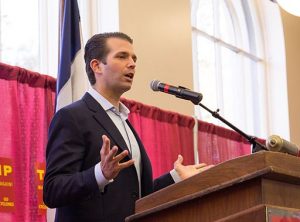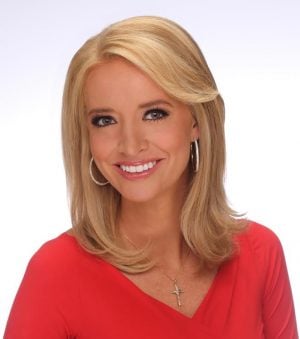Desperate Dems Contriving Criminality After Don Jr. Meeting
Without treason, collusion, conspiracy, or federal election law violations, the Democrats are left with... nothing.

Donald Trump Jr. (by Max Goldberg via Wikimedia)
Desperation is in the air. Democratic defiance of President Donald Trump has now turned into desperate efforts to construe criminality where none exists.
The revelation that Donald Trump Jr. met with a Russian lawyer in the hopes of receiving dirt on Hillary Clinton was immediately seized as an opportunity to play fast and loose with the law in an effort to demonize the administration. Facts were selectively chosen and statutes conveniently manipulated in an effort to falsely criminalize.

AI’s Impact On Law Firms Of Every Size

Failed Vice Presidential candidate Tim Kaine quickly took to the TV screen and asserted, “[T]his is moving into perjury, false statements and even potentially treason.”
The former Harvard Law School graduate had clearly forgotten his Constitution basics. Article III provides the grounds for treason: “Treason against the United States, shall consist only in levying War against them, or in adhering to their Enemies, giving them Aid and Comfort.”
How exactly did Trump Jr. “levy war” against the United States in attending a bait-and-switch meeting with a Russian lawyer that delivered no information about Clinton but instead centered around the lawyer’s hidden agenda of Russian adoption? Kaine’s suggestion was preposterous, as brilliantly argued by John Yoo in the Chicago Tribune.
In addition to treason, many Democrats have thrown around the word “collusion.” For one, collusion is not a clearly codified crime, except in the narrow case of antitrust law. And if Democrats are so concerned about “collusion”, where is the outrage over the DNC colluding with a consultant receiving information from Ukraine, information that in fact led to the ousting of former Trump campaign chairman Paul Manafort?
Sponsored

AI’s Impact On Law Firms Of Every Size


The Business Case For AI At Your Law Firm


Generative AI In Legal Work — What’s Fact And What’s Fiction?


Generative AI In Legal Work — What’s Fact And What’s Fiction?

Then comes the evidence-free “conspiracy” charge. Conspiracy, as defined in 18 U.S.C. § 371, occurs “[i]f two or more persons conspire either to commit any offense against the United States, or to defraud the United States, or any agency thereof in any manner or for any purpose.” The Court elucidated the meaning of this statute in Hass v. Henkel, suggesting that “defraud[ing]” means “impairing, obstructing or defeating the lawful function of any department of government.”
There is no suggestion Trump Jr. did anything of the sort, nor is there evidence he conspired to commit any sort of crime at all. Let’s not forget that this meeting occurred before there were any charges of Russia hacking the DNC. Though Americans have a keen eye for Russian meddling now, Trump Jr. had no reason to consider Russia meddling in the election at the point he accepted this meeting.
The final accusation from the left is a violation of federal campaign laws. 52 U.S.C. §30121(a)(2) says, “It shall be unlawful for . . . a person to solicit, accept, or receive a contribution or donation [from a foreign national].” A “contribution” is considered “anything of value” according to 52 U.S.C. § 30101(8)(a).
Jan W. Baran, former general counsel for the RNC, told the Los Angeles Times, “I have a hard time seeing how a meeting is a contribution from a foreign national. It’s not concrete. It doesn’t have a quantifiable value.”
Her analysis comports with a case that Newsweek highlighted, Bullman v FEC, where a district court explained that the statute does not bar foreign nationals from “speaking out about issues or spending money to advocate their views about issues.” The court emphasizes that exchange of money is the focus of the federal election provisions.
Sponsored

Law Firms Now Have A Choice In Their Document Comparison Software

How Transactional Lawyers Can Better Serve (And Maintain) Their Clients
So without treason, collusion, conspiracy, or federal election law violations, the Democrats are left with evidence-free accusations. But conclusions without substance will collapse in time as each of the seemingly innumerable investigations in Congress, in the FBI, and with the Special Counsel wrap up.
When that happens, Democrats will be forced to make the case to the American people for why they should retake the White House. Peddling in conspiracy theories will hardly help their case.
 Kayleigh McEnany is a CNN political commentator. She is a graduate of Harvard Law School and Georgetown University’s School of Foreign Service, and she also studied politics at Oxford University. In addition to writing a column for Above the Law, she is a contributor for The Hill. She can be found on Twitter at @KayleighMcEnany.
Kayleigh McEnany is a CNN political commentator. She is a graduate of Harvard Law School and Georgetown University’s School of Foreign Service, and she also studied politics at Oxford University. In addition to writing a column for Above the Law, she is a contributor for The Hill. She can be found on Twitter at @KayleighMcEnany.







